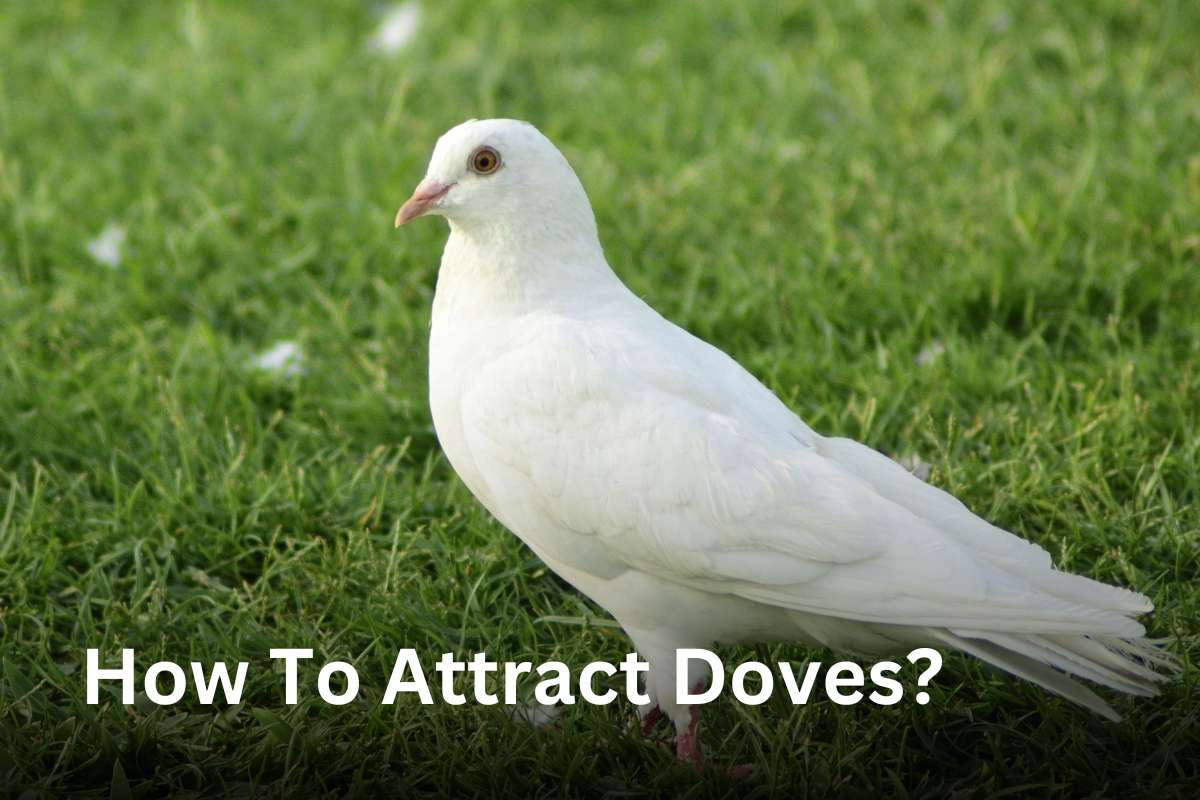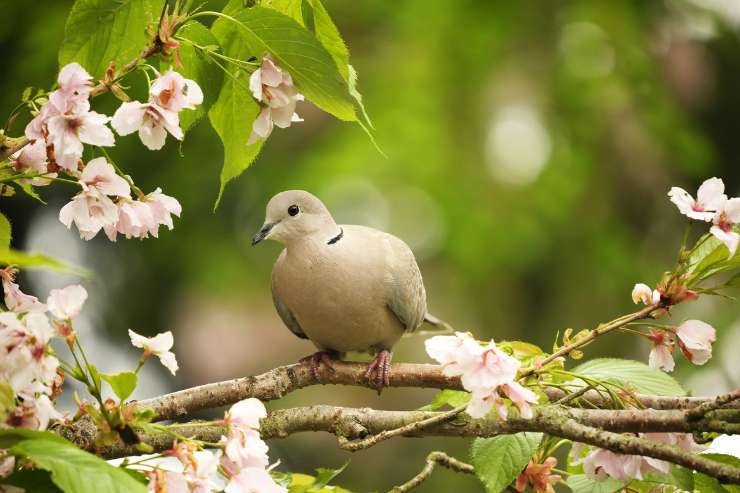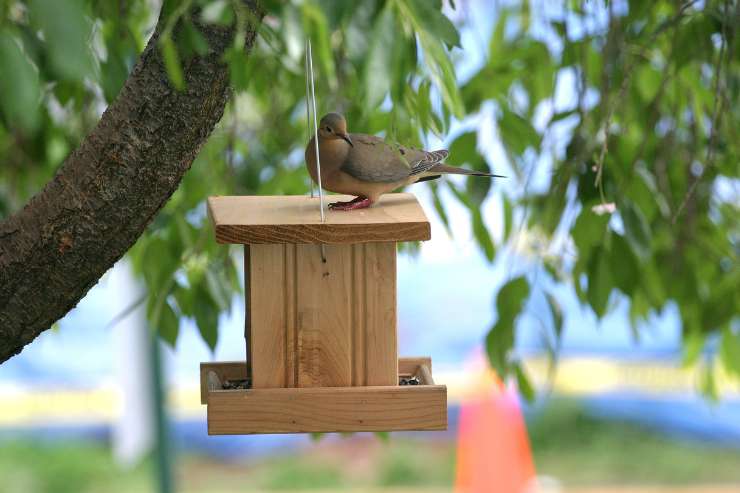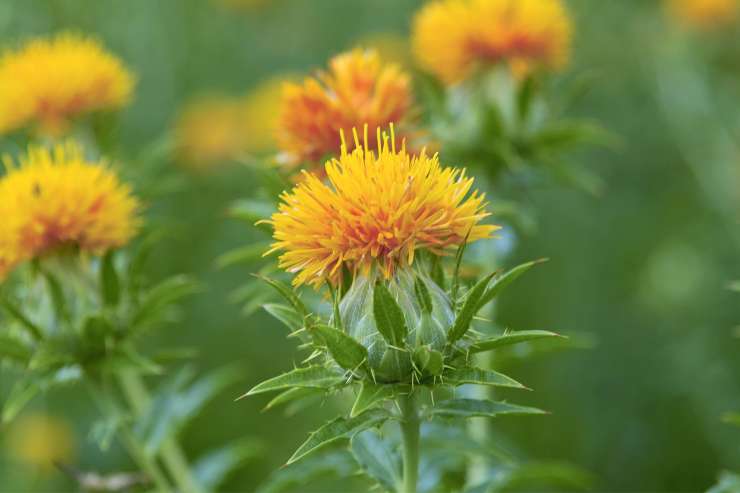How To Attract Doves?

Every one of us loves to enjoy watching birds in the gardens, parks, and yards. If you are a bird enthusiast or simply love to hear the soothing calls of the birds then attracting doves can enhance the beauty of your outdoor space.
Are you looking for how to attract doves to your backyard? If yes, then doves are gentle birds known for their soft cooing calls and graceful flight. Formerly, this bird was also termed the Carolina pigeon and Carolina turtledove.

One of the most common doves i.e. mourning doves is mainly found in the United States of America. Now, this species of dove is also known as the American mourning dove, chueybird, and rain dove.
Let us delve into this article to know how you can attract doves to your backyard with some of the proven effective methods. Without any further delay let us go through this blog post.
Understanding Doves
The dove is a medium-sized bird widely distributed in various open and semi-open habitats, such as farms, prairie, urban areas, grassland, and lightly wooded areas.
As a result, this bird avoids swamps and thick forest areas. It is a migratory bird that usually migrates in the flocks during the daytime and at low altitudes.
This species of bird is a resident in most of Mexico, the Greater Antilles, southern Canada, and the Continental United States.
Mating, Nesting, Eggs & Hatchlings of Doves
Generally, the mourning doves are monogamous, as they form a single pair throughout the year. During the breeding season, these species of doves are known to breed multiple times and may raise to six broods in a season.
In mourning doves, the process of nest-building involves the male doves in identifying potential nesting locations. Male mourning doves showcase a set of courtship displays to attract the female doves.
During the courtship, the male makes a noisy flight by outstretching its wings and head down in a circular glide. Thereafter, the male bird approaches to attract the female bird with a loud call, puffed-out breast, and bobbing head.
Once a pair is formed, the female bird selects a nesting site on the ground. Then, the female dove builds potential nests. The nest is built of twigs, grass blades, and conifer needles.
It is observed that mated pairs often preen each other feathers after courtship. Females always lay two eggs in a single clutch size. However, the three or four eggs are laid in another nest.
The incubation period lasts about two weeks. Over that period, both male and female doves are well-known as devoted parents. As a parent, both of them take care of their young ones. The newly hatched young ones are called squabs.
During the first three to four days, the squabs are fed crop milk that is augmented by seeds. Overall, mourning doves have a high mortality rate.
Gradually, the process of fledging takes place between 11 to 15 days. Young squabs have to stay with their father i.e. male dove for about two weeks after fledging.
7 Proven Ways How To Attract Doves?
Provide Food
Being a member of the Columbidae family, the mourning doves are primarily seed-eating birds. Moreover, the seeds are consumed by them which includes 99% of their main diet.
Depending upon their diet preferences and the availability of food, the doves consume a variety of other foods.
Some of the foods eaten by doves are sunflower seeds, millet, cracked corn, rapeseed, safflower, pine nuts, wheat, canary grass, and sorghum.
Even you can attract these lovely birds to your yards by offering them nutritional fruits and green leafy vegetables. Such as berries, peas, and pumpkin seeds. Besides this, they also eat snails or insects.
Provide Water Sources
As we all know, water is essential for all living beings in the world whether they are human beings, birds, or animals. Similarly, the doves also require water not for drinking purposes.
But, also for bathing, grooming, and maintaining their plumage. So, it is necessary to provide a clean and accessible water source in your yards.
Another method of providing water to doves and other birds is by installing a birdbath, fountains, or small ponds in your yard. Always try to keep the birdbath or fountains in open areas.
Providing Best Feeders
If you are a bird enthusiast and you are looking to attract mourning doves into your garden or yard. Then, one of the intriguing questions often arises how you should be feeding the mourning doves or any other species of birds?
Indeed, it is equally important to choose the right feeder as you are choosing the right food for them. These medium-sized birds often prefer to live in open areas.

In North America, the mourning doves are mostly attracted by the bird feeders in the largest range of seed types.
Due to its ground-foraging nature, doves do not dig or scratch for seeds. They collect aside readily visible ground litter and then fly away to digest it later in safely.
Typically, some best feeders prefer feeding on the ground rather than at heightened levels. So, you can create an attractive feeding station for your feathered friend to visit your backyard regularly.
There are certain types of feeders like ground feeders, platform feeders, tray feeders, hopper feeders, duo set feeders, and large-capacity feeders.
Planting Native Trees In Your Yard
There is a variety of things you can do in your outdoors to attract doves. Another important thing you can do is to plant the right types of plants in your yard.
By using native plants, it is believed that these are more likely to attract local insects.

Plants such as
- Sunflowers
- Safflower
- Wheat
- Ash Tree
- Goldenrod
- Pokeweed
- Native Grasses
- Corn
Provide Shelter
In the natural environment of your backyard, if you are seeking to attract doves then you can shelter them. With the help of it, doves can rest, nest, and protect themselves from predators.
Install the nesting boxes and offer them roosting perches in your yards throughout the year. You can place bushes, leaf litter, dead trees, or fallen branches near open areas to provide them an additional shelter.
Avoid Pesticides
It is important to consider that your backyards are clean and safe by avoiding the use of pesticides. The use of pesticides in gardens, parks, or backyards can disrupt the balance of the ecosystem in different ways.
It can harm the beneficial insects, soil, and other species of birds and insects. Apart from that, you can encourage promoting natural pest control to manage insect populations.
Instead, it becomes essential to create a pesticide-free environment to preserve the food sources and protect doves from potential harm.
Keep Your Yard Clean and Free From Predators
One of the things you can do to attract doves to your yard is to build a house for them. But before that, you need to be careful that yards are free from predators like hawks, snakes, falcons, and many more.
It’s important to create a predator-free environment to ensure their safety and overall well-being. Along with that, to keep your feathered friend safe, it is also essential to keep your yard clean and tidy.
When you are providing food and water sources to the dove and other species of birds then cleanliness becomes an essential part. Notably, the birdbaths, birth feeders, and their dishes shall be cleaned regularly.
Importance of Attracting Doves To Your Backyard
Attracting doves to your backyard can be very beneficial for the birdwatcher as well as the birds themselves. Firstly, it can benefit from natural pest control services, since they eat insects.
Not only that, the presence of doves in your yard may indicate a healthier ecosystem with ample food, water sources, shelter, and feeders.
They are considered an important part of the ecosystem. By attracting them, you can create an opportunity to monitor their behavior and listen to their soothing calls closely in your backyard.
What Are Predators of Doves?
Doves have a variety of predators like other species of birds. Some of the predators of doves are:
Birds of Prey: Predatory birds such as falcons and hawks are diurnal birds of prey. They are known as skilled hunters who often hunt from above by swooping down and catching their prey.
Other Birds: There are some birds such as corvids, grackles, cowbirds, and magpies that prey on doves’ eggs during the nesting period.
Snakes: Some species of snakes like rat snakes and kingsnakes are the ones that are known to raid nests and prey on their eggs or young chicks.
Conclusion
By creating a safe and pleasing environment in gardens, parks, or backyards you can welcome this species of doves by building nesting sites, providing them with food and water, and ensuring their safety and it is free from predators.
With patience and dedication, you can attract doves or other species of beautiful birds right into your backyard.
Frequently Asked Questions About Doves
What attracts doves the most?
Sunflower seeds, grains, millet, and wheat are their favorite food to attract doves mostly in your yards.
Are doves hunted?
Yes, doves are hunted. It is a popular sport in various parts of the country. In North America and Argentina, dove hunting is one of the most hunted migratory game birds.
What is the best way to attract doves for hunting?
The best way to attract doves for hunting is by offering them a variety of seeds and grains. Besides this, another effective method can be cultivating plants, and shrubs like millet, wheat, sunflower seeds, and many more.
What do doves eat while nesting?
While nesting, doves mostly eat seeds and grains which take nearly about 99% of their diet. Other than that, also consume small insects and larvae to provide additional protein supplements in their diet. Their nutritional dietary needs may vary depending on factors such as environmental conditions and the availability of food sources nearby them.
What fruit do doves eat?
Doves eat a wide range of foods as they primarily feed mainly on seeds. But, it also consumes a variety of fruits like berries, pears, grapes, cherries, and apples.

